
Waise Lee Chi-hung
Born 12/19/1959 in Hong Kong
Perhaps the receding hairline never really
gave Waise a chance to be more than a character actor/villain, but at least
at the beginning he appeared to be headed in the direction of leading men
roles. Before films he worked as a model and was noticed by Tsui Hark in
a TV commercial and asked to come in for an audition.
 At the time Tsui was in the process of producing
a little film for an old friend who seemed to be running out of career
options. The friend was John Woo and the film was A Better Tomorrow (1986).
Tsui liked what he saw and cast Waise as the slick well-dressed villain
in the piece who has to match wits and firepower with Chow Yun Fat and
Ti Lung. Tsui followed this though with two solid good guy roles for Waise
– the brutal but brilliant The Big Heat (1988) in which Waise ably portrays
a conflicted dedicated cop and in Gunmen (1988) as one of the small band
of honest cops fighting corruption. Though Waise had no training whatsoever
in martial arts, he managed to look fairly convincing in his action scenes
in these early films and in later films as well. In 1989 he was to appear
in one more Tsui Hark film, the anaemic comedy Spy Games.
At the time Tsui was in the process of producing
a little film for an old friend who seemed to be running out of career
options. The friend was John Woo and the film was A Better Tomorrow (1986).
Tsui liked what he saw and cast Waise as the slick well-dressed villain
in the piece who has to match wits and firepower with Chow Yun Fat and
Ti Lung. Tsui followed this though with two solid good guy roles for Waise
– the brutal but brilliant The Big Heat (1988) in which Waise ably portrays
a conflicted dedicated cop and in Gunmen (1988) as one of the small band
of honest cops fighting corruption. Though Waise had no training whatsoever
in martial arts, he managed to look fairly convincing in his action scenes
in these early films and in later films as well. In 1989 he was to appear
in one more Tsui Hark film, the anaemic comedy Spy Games.
 In 1990 he had a solid role as the honorable Swordsman
Hu in A Chinese Ghost Story II, but his most famous role to date was back
with John Woo as one of the three friends in A Bullet to the Head. This
was a challenging role in which Waise’s character shifts from being a good
loyal friend to a man obsessed with gaining wealth to the point of betraying
his boyhood friends. I’ve always felt the writing let his character down,
as the transition from good to evil was much too abrupt and never quite
convincing.
In 1990 he had a solid role as the honorable Swordsman
Hu in A Chinese Ghost Story II, but his most famous role to date was back
with John Woo as one of the three friends in A Bullet to the Head. This
was a challenging role in which Waise’s character shifts from being a good
loyal friend to a man obsessed with gaining wealth to the point of betraying
his boyhood friends. I’ve always felt the writing let his character down,
as the transition from good to evil was much too abrupt and never quite
convincing.
 Though Waise has made some forty more films since
A Bullet in the Head – occasionally as a good guy but more often as the
villain – this was to a large degree the highlight of his career. After
this his roles became generally smaller and many of the films were of the
low budget action variety. Some of these action films are Pink Bomb, Lady
Supercop, The First Shot, Forbidden Arsenal, The Avenging Quartet, Murders
Made to Order, A Taste of Killing and Romance, Red Zone, The Cat, Roar
of the Vietnamese and Tough Beauty and Sloppy Shop.
Though Waise has made some forty more films since
A Bullet in the Head – occasionally as a good guy but more often as the
villain – this was to a large degree the highlight of his career. After
this his roles became generally smaller and many of the films were of the
low budget action variety. Some of these action films are Pink Bomb, Lady
Supercop, The First Shot, Forbidden Arsenal, The Avenging Quartet, Murders
Made to Order, A Taste of Killing and Romance, Red Zone, The Cat, Roar
of the Vietnamese and Tough Beauty and Sloppy Shop.
 Waise still had a few opportunities to appear
in some other types of films though – as Asia the Invincible’s ally/enemy
in Swordsman II, a silly comedic role in the classic Wing Chun, the villain
in both Running Out of Time and Conman, Hu Du Men, 13 Cold Blooded Eagles
and a doctor in the creepy Inner Senses (2002).
Waise still had a few opportunities to appear
in some other types of films though – as Asia the Invincible’s ally/enemy
in Swordsman II, a silly comedic role in the classic Wing Chun, the villain
in both Running Out of Time and Conman, Hu Du Men, 13 Cold Blooded Eagles
and a doctor in the creepy Inner Senses (2002).
 Besides his film career, Waise has been in many
TV series at TVB over the years. He now lives in Canada but returns to
Hong Kong whenever he can to act in films. Though much of his career/roles
were in forgettable films, he always has brought a certain combination
of sleek swagger and suaveness that has set him apart from nearly all of
the other Hong Kong villains that have populated films and has made him
one of the better recognized actors around.
Besides his film career, Waise has been in many
TV series at TVB over the years. He now lives in Canada but returns to
Hong Kong whenever he can to act in films. Though much of his career/roles
were in forgettable films, he always has brought a certain combination
of sleek swagger and suaveness that has set him apart from nearly all of
the other Hong Kong villains that have populated films and has made him
one of the better recognized actors around.
Walter Cho/ Cho Tat-wah/ Tso Tat-Wah/
Cao Da Hua
Born in 1916
With a body of work encompassing seven decades
and around 700 movies, Cho Tat-wah comes across as one of the more prolific
and enduring actors ever, not just of Hong Kong cinema but of the whole
world as well. Of the lot, about 200 were martial art films alone and he
also performed in nearly fifty spy and detective movies. In the eighties
he could often be caught in either one of these colourful martial outfits
or in his trademark fedora and overcoat playing a police inspector - twinkle
eye guest appearances that evoked his earlier famous brand of roles.
 Cho was born in Guangtung province in 1916, but
his parents soon settled in Hong Kong. As a student he would sneak out
of school to watch silent movies and it was while viewing a martial art
film THE HERO OF GUANGDONG that he decided to become an actor. At the time
though there was no movie making in Hong Kong so he went to Shanghai, the
booming centre of the Chinese film industry. This was 1931 with Cho
a mere fifteen years of age. There wasn’t much work beyond being an extra
or getting a bit part however. His first sound movie was in 1935, with
FRENZY an anti-Japanese propaganda film.
Cho was born in Guangtung province in 1916, but
his parents soon settled in Hong Kong. As a student he would sneak out
of school to watch silent movies and it was while viewing a martial art
film THE HERO OF GUANGDONG that he decided to become an actor. At the time
though there was no movie making in Hong Kong so he went to Shanghai, the
booming centre of the Chinese film industry. This was 1931 with Cho
a mere fifteen years of age. There wasn’t much work beyond being an extra
or getting a bit part however. His first sound movie was in 1935, with
FRENZY an anti-Japanese propaganda film.
 Soon after when movie studios began to emerge
in Hong-Kong, Cho moved back to his native city where he managed to get
a job as an assistant director for a company. It wasn’t long though that
he found his way in front of the camera with BANDITS FROM SHANTUNG and
other bit parts. As time went on though his roles became bigger, he got
noticed in a supporting role in UNARMED COMBAT (37) although his first
lead role wasn’t until THE JOURNEY OF THE HEROINE (1939). His sister
Tso Yi-man was one of the leading actresses of the late 1930's and his
young daughter Tso Man-yee became a child actress. For the next two years
Cho played in more than eighteen movies, but in 1941 however the Japanese
invaded H-K bringing the movie industry to a complete stop.
Soon after when movie studios began to emerge
in Hong-Kong, Cho moved back to his native city where he managed to get
a job as an assistant director for a company. It wasn’t long though that
he found his way in front of the camera with BANDITS FROM SHANTUNG and
other bit parts. As time went on though his roles became bigger, he got
noticed in a supporting role in UNARMED COMBAT (37) although his first
lead role wasn’t until THE JOURNEY OF THE HEROINE (1939). His sister
Tso Yi-man was one of the leading actresses of the late 1930's and his
young daughter Tso Man-yee became a child actress. For the next two years
Cho played in more than eighteen movies, but in 1941 however the Japanese
invaded H-K bringing the movie industry to a complete stop.
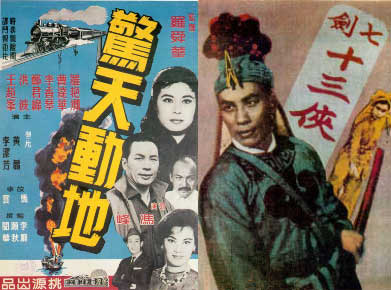 By Cho’s own account the occupation period was
very tough, but he actually thrived by entering the business of selling
second-hand items at a much higher price that he had paid for it. Cho became
a very rich man that way, enough to indulge in his taste for expensive
cars as well as to eventually start his own studio Yau Kin in 1948.
By Cho’s own account the occupation period was
very tough, but he actually thrived by entering the business of selling
second-hand items at a much higher price that he had paid for it. Cho became
a very rich man that way, enough to indulge in his taste for expensive
cars as well as to eventually start his own studio Yau Kin in 1948.
Cho went back to being in the movies in 1946
with the Mandarin production GONE WERE THE SWALLOWS WHEN THE WILLOW FLOWERS
WITHERED. He returned to the local Cantonese spoken cinema the following
year with TEARS OF RECOVERY. Besides owning a movie studio he also managed
and organised a couple of others, the bulk of their production being martial
art movies such as the long running serial SEVEN SWORDS AND THIRTEEN HEROES
(49-67), and the WORLD OF FIST.
 In 1949, Tso was cast as Leung Foon, the head
disciple of Wong Fei Hung in the famous titular black and white serial
that lasted for more than two decades. In all he played in 49 of the 65
WFH first run films from the late forties to the early sixties. Cho wasn’t
actually a martial artist at all, although with some preparation he could
mimic some moves, but his starring name was a guarantee for both financial
sponsors as well of course for an audience. Besides the Wong Fei Hung movies
Cho also starred in other Southern martial myth related movies such as
the Shaolin Temple, the Ten Heroes of Guangtung, Hung Xie Kwan, and even
the Iron Monkey. Given his physical limitations though Cho was most much
more comfortable starring in “Palm power’s” - Cantonese swordplay
films which featured mostly special effects instead of real kicks or punches.
So he became one of the sub-genre lead stars throughout the fifties and
sixties starring in such classics as THE BURNING OF THE RED LOTUS MONASTERY
(50) or the BRAVE ARCHER (51) among hundreds of titles. It was also
in the fifties that he started doing detective or spy thriller movies.
Through the years he made around fifty of those, the most famous being
THE KIDNAPPERS (61) and SECRET AGENT NO 1.
In 1949, Tso was cast as Leung Foon, the head
disciple of Wong Fei Hung in the famous titular black and white serial
that lasted for more than two decades. In all he played in 49 of the 65
WFH first run films from the late forties to the early sixties. Cho wasn’t
actually a martial artist at all, although with some preparation he could
mimic some moves, but his starring name was a guarantee for both financial
sponsors as well of course for an audience. Besides the Wong Fei Hung movies
Cho also starred in other Southern martial myth related movies such as
the Shaolin Temple, the Ten Heroes of Guangtung, Hung Xie Kwan, and even
the Iron Monkey. Given his physical limitations though Cho was most much
more comfortable starring in “Palm power’s” - Cantonese swordplay
films which featured mostly special effects instead of real kicks or punches.
So he became one of the sub-genre lead stars throughout the fifties and
sixties starring in such classics as THE BURNING OF THE RED LOTUS MONASTERY
(50) or the BRAVE ARCHER (51) among hundreds of titles. It was also
in the fifties that he started doing detective or spy thriller movies.
Through the years he made around fifty of those, the most famous being
THE KIDNAPPERS (61) and SECRET AGENT NO 1.
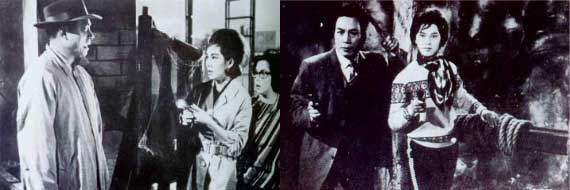 Despite a rich career, Cho had a couple of setbacks.
In 1951 an uninsured Cho saw his studio burn down to the ground in a blaze.
With the help of Singaporean partner he regrouped and launched another
studio two years later. Another problem for Cho was also his consummate
gambling habits with horses and Macao’s casinos. Once as he drove by the
new Jockey Club administrative building with a friend the latter said ”
Look you built that”. Cho never worried about this though and every-time
he lost too much money he would sell one of his properties. In the
end though he had sold everything and had nothing left.
Despite a rich career, Cho had a couple of setbacks.
In 1951 an uninsured Cho saw his studio burn down to the ground in a blaze.
With the help of Singaporean partner he regrouped and launched another
studio two years later. Another problem for Cho was also his consummate
gambling habits with horses and Macao’s casinos. Once as he drove by the
new Jockey Club administrative building with a friend the latter said ”
Look you built that”. Cho never worried about this though and every-time
he lost too much money he would sell one of his properties. In the
end though he had sold everything and had nothing left.
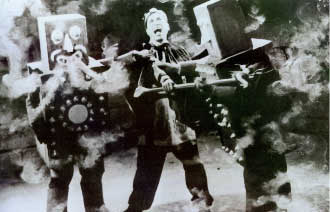 In the early sixties Cho starred in the highly
popular “BUDDHA PALMS” (4 movies 1964-1965). By then though despite remaining
a presence in the Cantonese martial art movies, his favourite brand of
films were the thrillers showcasing the fedora, overcoat wearing intrepid
inspector Wah. With the decline of Cantonese cinema, Cho in the second
half of the sixties started taking some time off from the movies and starred
in only a few, such as the SUPREME SWORD (69) and SECRET AGENT NO 1, his
one directorial effort. The same year Cantonese cinema collapsed entirely
putting a definitive end to Cho’s film golden years.
In the early sixties Cho starred in the highly
popular “BUDDHA PALMS” (4 movies 1964-1965). By then though despite remaining
a presence in the Cantonese martial art movies, his favourite brand of
films were the thrillers showcasing the fedora, overcoat wearing intrepid
inspector Wah. With the decline of Cantonese cinema, Cho in the second
half of the sixties started taking some time off from the movies and starred
in only a few, such as the SUPREME SWORD (69) and SECRET AGENT NO 1, his
one directorial effort. The same year Cantonese cinema collapsed entirely
putting a definitive end to Cho’s film golden years.
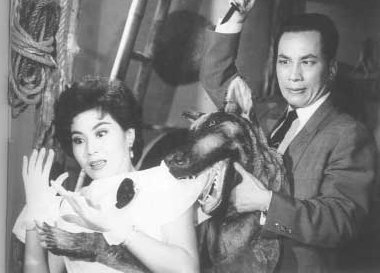 In the first half of the seventies, Cho made a
unique film appearance in COUNTRY BUMBKIN IN STYLE (74). In 1976 he started
acting in TV starring as, what else, a police inspector in the drama series
MALE AND FEMALE KING KONG. He also took part in many martial art TV serials
such as LEGEND OF THE CANTON HEROES and BOXER FROM CANTON among many others.
Starting in 1979 he returned more constantly to the film world with parts
in an handful of Shaw Brothers martial art movie such as Chang Cheh’s SHAOLIN
RESCUERS (79), CONVICTS KILLERS, THE KILLER CONSTABLE, TWO CHAMPIONS OF
SHAOLIN (all 1980) and MY YOUNG AUNTIE (81).
In the first half of the seventies, Cho made a
unique film appearance in COUNTRY BUMBKIN IN STYLE (74). In 1976 he started
acting in TV starring as, what else, a police inspector in the drama series
MALE AND FEMALE KING KONG. He also took part in many martial art TV serials
such as LEGEND OF THE CANTON HEROES and BOXER FROM CANTON among many others.
Starting in 1979 he returned more constantly to the film world with parts
in an handful of Shaw Brothers martial art movie such as Chang Cheh’s SHAOLIN
RESCUERS (79), CONVICTS KILLERS, THE KILLER CONSTABLE, TWO CHAMPIONS OF
SHAOLIN (all 1980) and MY YOUNG AUNTIE (81).
 The Eighties saw Cho put-up many of his special
guest appearances as police chief, inspectors or secret agents in such
action comedies as ACES GO PLACES, MY LUCKY STAR and TWINKLE TWINKLE LUCKY
STAR. In WINNERS AND SINNERS he could even be seen clothed in his old WFH
Leung Foon outfit again, playing a street performer (alongside another
Wong Fei-hung veteran actor, Sai Gwa Pau). He was cast in a couple “Palm
Power” modern pastiche BUDDHA PALM (83) and much later KUNG-FU VS ACROBATIC
(93), as well as playing second fiddle to either Kwan Tak-in the original
Wong Fei Hung in ACES GO PLACES IV and IT’S A WONDERFUL WORLD, or even
Sek-Kin (who played the perpetual bad guy in the WFH serial) in WIDOW WARRIOR
(89).
The Eighties saw Cho put-up many of his special
guest appearances as police chief, inspectors or secret agents in such
action comedies as ACES GO PLACES, MY LUCKY STAR and TWINKLE TWINKLE LUCKY
STAR. In WINNERS AND SINNERS he could even be seen clothed in his old WFH
Leung Foon outfit again, playing a street performer (alongside another
Wong Fei-hung veteran actor, Sai Gwa Pau). He was cast in a couple “Palm
Power” modern pastiche BUDDHA PALM (83) and much later KUNG-FU VS ACROBATIC
(93), as well as playing second fiddle to either Kwan Tak-in the original
Wong Fei Hung in ACES GO PLACES IV and IT’S A WONDERFUL WORLD, or even
Sek-Kin (who played the perpetual bad guy in the WFH serial) in WIDOW WARRIOR
(89).
 In 1990, Cho immigrated to London for a while,
before coming back to H-K in 1993 because he felt like a third class citizen
there, and started doing TV again. He took a new leave of absence in 1997
to take care of his ailing wife who had kidney problems, but returned upon
her death in the summer 2001. While he has grown estranged from contemporary
movies, he doesn’t mind the occasional role. Thus he could be seen in A
GAMBLER STORY (2001) and he expresses the desire to make a guest starring
appearance for old time sake in a new BUDDAH PALM like movie project.
In 1990, Cho immigrated to London for a while,
before coming back to H-K in 1993 because he felt like a third class citizen
there, and started doing TV again. He took a new leave of absence in 1997
to take care of his ailing wife who had kidney problems, but returned upon
her death in the summer 2001. While he has grown estranged from contemporary
movies, he doesn’t mind the occasional role. Thus he could be seen in A
GAMBLER STORY (2001) and he expresses the desire to make a guest starring
appearance for old time sake in a new BUDDAH PALM like movie project.
(Written up by Yves Gendron)
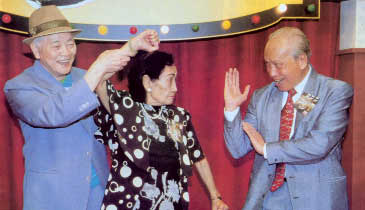
(Walter Cho with fellow legends
Lau Kau and Chin Tsi-ang in 2002)
Wan Kong
He is best known as a popular Cantonese singer,
but from time to time he has taken on bit roles in films – such as in The
Banquet as one of the waiters.
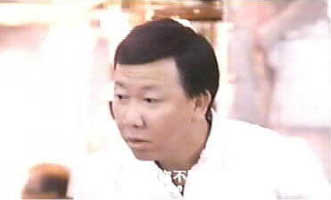
Wan Tin-chiu, Eric
Eric is most famous in Hong Kong for his role
as a vampire killer in the quite popular ATV series – My Date with a Vampire
that has run for the past few years. Some of his other TV series have been
Chameleon 97, Reincarnation II, A Lawyer Can Be Good and Vampire Expert
2.
 He has also crossed over to films on a few occasions
– primarily in the horror genre. These are House of the Damned, Erotic
Nightmare, Horoscope I and Ghost Promise. Other than these horror outings,
he has shown up in the solid action flick, Sharp Guns and Century of the
Dragon.
He has also crossed over to films on a few occasions
– primarily in the horror genre. These are House of the Damned, Erotic
Nightmare, Horoscope I and Ghost Promise. Other than these horror outings,
he has shown up in the solid action flick, Sharp Guns and Century of the
Dragon.
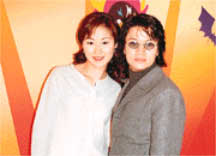
Wanda Yung Wai-tak
Wanda only had roles in a very few films and
her tall gawky build is not necessarily one you would remember, but because
of my first odd viewing experience with her she is someone I find difficult
to forget.
 While watching the Frankie Chan film, Oh! Yes
Sir (1994), his male police partner constantly puzzled me. There just was
something wrong with him, but it was never part of the story so I thought
I was imagining things. I swore that he had breasts, but was never able
to verify this. Then co-incidentally I watched Skinny Tiger and Fatty Dragon
(1990) only a few days later and lo and behold – there was the same actor
– but this time as Karl Mak’s girlfriend. And this was of course Wanda
Yung. It still bothers me – why did they choose a female to portray a horny
male police cop in Oh! Yes Sir? I guess I will never know.
While watching the Frankie Chan film, Oh! Yes
Sir (1994), his male police partner constantly puzzled me. There just was
something wrong with him, but it was never part of the story so I thought
I was imagining things. I swore that he had breasts, but was never able
to verify this. Then co-incidentally I watched Skinny Tiger and Fatty Dragon
(1990) only a few days later and lo and behold – there was the same actor
– but this time as Karl Mak’s girlfriend. And this was of course Wanda
Yung. It still bothers me – why did they choose a female to portray a horny
male police cop in Oh! Yes Sir? I guess I will never know.
 Two other films in which I have come across Wanda
(as a female in both!) were in The Romancing Star III as one of the sisters
and in the terrific1994 volleyball film, Victory, in which she plays the
head coach of the opposing team. She was credited with a 2000 film, Treasure
Hunter in which she plays an assassin.
Two other films in which I have come across Wanda
(as a female in both!) were in The Romancing Star III as one of the sisters
and in the terrific1994 volleyball film, Victory, in which she plays the
head coach of the opposing team. She was credited with a 2000 film, Treasure
Hunter in which she plays an assassin.
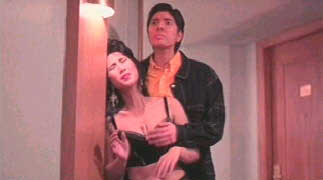
Wang Lai/Wong Loi
Born in Beijing in 1927
She was a big star back in the Hong Kong Mandarin
films of the 1950s and 60s. The book The Cathay Story refers to her as
“The eternal Wang Lai, in many minds the most important character actress
in the history of Hong Kong Mandarin cinema”. After graduating from
the Peking Teachers College, she joined the Film Workers Drama Troupe in
1943. In 1951 she began acting in films and the next year she went to Hong
Kong and acted in The Handsome Man. With roles in over 200 films she became
known as the “actress with a thousand faces”.
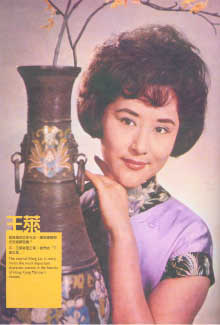 She worked for a number of studios before joining
Cathay (formerly MP & GI) in 1958. She made over fifty films for this
studio from 1958 to 1967 – among them well regarded films such as The Wild,
Wild Rose, Father Takes a Bride, Golden Lotus, Her Tender Heart, Sister
Long Legs and Father and Son (for which she received the Best Supporting
Actress award).
She worked for a number of studios before joining
Cathay (formerly MP & GI) in 1958. She made over fifty films for this
studio from 1958 to 1967 – among them well regarded films such as The Wild,
Wild Rose, Father Takes a Bride, Golden Lotus, Her Tender Heart, Sister
Long Legs and Father and Son (for which she received the Best Supporting
Actress award).
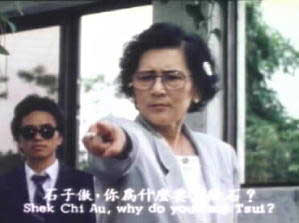 After this she became a freelance actress working
for studios in Hong Kong and Taiwan – and some of these films were Back
Alley Princess, Naughty! Naughty!, Love by Post, Broken Oath and The Secret.
She is now retired – her last films being roles in Ang Lee’s Pushing Hands
(for which she received the Golden Horse Best Supporting Actress Award),
The Widow Warriors (the matriarch) and Ann Hui’s My American Grandson.
After this she became a freelance actress working
for studios in Hong Kong and Taiwan – and some of these films were Back
Alley Princess, Naughty! Naughty!, Love by Post, Broken Oath and The Secret.
She is now retired – her last films being roles in Ang Lee’s Pushing Hands
(for which she received the Golden Horse Best Supporting Actress Award),
The Widow Warriors (the matriarch) and Ann Hui’s My American Grandson.

(Information gathered from the book – The Cathay
Story)
Wang Lung-wai/Johnny Wang Lung Wai/Johnny
Wong.
In Chinese “ Lung Wai” means “as Invincible
or as Mighty as the Dragon”. With his fierce, burly looks, his ruthlessly
minded characters and his superb screen fighting skills, none are much
more deserving of such a name than Shaw Brother’s studio powerhouse k-f
villain Wang Lung-wai. His attitude and spectacular bouts with the likes
of Chen Kwan Chun, Fu Sheng, Lau Kar Fei (better known as Gordon Liu or
Lau in the West) and the Venoms have made him one of classic k-f ‘s favourite
heavies
 Nothing is known by this reviewer of Wang Lung-wei’s
history before he started appearing in movies, or how he got into them.
It seems likely however that he already had an extended background of martial
arts just as Gordon Liu did. An interesting titbit though, Wang is known
to have expressed the desire to challenge Bruce Lee before the man’s death
put an end to such an aspiration, which may say something about his level
of skill and ego. Either he was spotted as a stuntman on a studio set or
more likely entered the Shaw’s Studio acting course. In any case, Wang
eventually found his way to Taiwan working on a film by Shaw top-Martial
director Chang Cheh: SHAOLIN MARTIAL ART (74) which also saw the debut
of the likes of Leung Kar-yan and the aforementioned Gordon Liu. His part
as a specially trained Manchu super-fighter called for him to remain mute
with a blank expression throughout the film. This didn’t give him much
opportunity to shine - until he got to fight that is, when he started kicking
some major ass. This was a great promising beginning.
Nothing is known by this reviewer of Wang Lung-wei’s
history before he started appearing in movies, or how he got into them.
It seems likely however that he already had an extended background of martial
arts just as Gordon Liu did. An interesting titbit though, Wang is known
to have expressed the desire to challenge Bruce Lee before the man’s death
put an end to such an aspiration, which may say something about his level
of skill and ego. Either he was spotted as a stuntman on a studio set or
more likely entered the Shaw’s Studio acting course. In any case, Wang
eventually found his way to Taiwan working on a film by Shaw top-Martial
director Chang Cheh: SHAOLIN MARTIAL ART (74) which also saw the debut
of the likes of Leung Kar-yan and the aforementioned Gordon Liu. His part
as a specially trained Manchu super-fighter called for him to remain mute
with a blank expression throughout the film. This didn’t give him much
opportunity to shine - until he got to fight that is, when he started kicking
some major ass. This was a great promising beginning.
 Wang spent the next three years working in Taiwan
exclusively for Chang Cheh, playing either Manchu fiendish henchmen or
traitorous Chinese collaborators in such films as FIVE SHAOLIN MASTERS
(74), MARCO POLO (75), NEW SHAOLIN BOXERS (76), SHAOLIN TEMPLE. Back in
Hong-Kong and the huge Shaw studio lot, Wang continued to do films with
Chang such as BRAVE ARCHER (77), THE CHINATOWN KID and cult favourite
FIVE VENOM (78) where he got an all too rare non-fighting part as
a corrupt judge. He was probably one of Shaw’s busiest performers as he
played movie villains for a good dozen of other Shaw Brother’s movies throughout
the years including such classics as AVENGING EAGLE (78), TREASURE HUNTERS
(82) and LADY ASSASSIN (83) among others.
Wang spent the next three years working in Taiwan
exclusively for Chang Cheh, playing either Manchu fiendish henchmen or
traitorous Chinese collaborators in such films as FIVE SHAOLIN MASTERS
(74), MARCO POLO (75), NEW SHAOLIN BOXERS (76), SHAOLIN TEMPLE. Back in
Hong-Kong and the huge Shaw studio lot, Wang continued to do films with
Chang such as BRAVE ARCHER (77), THE CHINATOWN KID and cult favourite
FIVE VENOM (78) where he got an all too rare non-fighting part as
a corrupt judge. He was probably one of Shaw’s busiest performers as he
played movie villains for a good dozen of other Shaw Brother’s movies throughout
the years including such classics as AVENGING EAGLE (78), TREASURE HUNTERS
(82) and LADY ASSASSIN (83) among others.
 What made him such an invaluable player was not
just his mean look and great screen fighting skills but also his ability
to “sell” his opponent as great fighter even though they were actually
not as proficient as him in real life. That’s not as easy at it sounds.
Superb bootmaster and screen villain favourite Hang Jang Lee frequently
so completely dominated his opponents in his bouts that when finally he
had to be beaten it looked lame and thus diminishing the believability
of the spectacle. Not so with Wang Lung Wei who would deliver a superb
fighting performance and then look convincingly beaten without the fight
ever losing it’s edge or credibility, an aspect of screen fighting which
involves much more than martial artistry or plain choreography but fine
physical “acting” skills as well.
What made him such an invaluable player was not
just his mean look and great screen fighting skills but also his ability
to “sell” his opponent as great fighter even though they were actually
not as proficient as him in real life. That’s not as easy at it sounds.
Superb bootmaster and screen villain favourite Hang Jang Lee frequently
so completely dominated his opponents in his bouts that when finally he
had to be beaten it looked lame and thus diminishing the believability
of the spectacle. Not so with Wang Lung Wei who would deliver a superb
fighting performance and then look convincingly beaten without the fight
ever losing it’s edge or credibility, an aspect of screen fighting which
involves much more than martial artistry or plain choreography but fine
physical “acting” skills as well.
Of all the Shaw Brothers’s directors, none
used him as well as martial art master filmmaker Lau Kar Leung, who cast
him in more elaborate parts than just the plain movie fighting bad-ass.
In DIRTY HO for example instead of his usual powerhouse k-f opponent, he
played a suave, wine tasting assassin who tries to do Gordon Liu in with
a fan and subtle k-f strokes all the while holding a courteous conversation
with his target. In MY YOUNG AUNTIE he played the greedy older uncle
who is challenged by Lau Kar Leung himself at the end. His best part
though was in MARTIAL CLUB, where he played not a villain for once but
an honourable Northern master duped by the film’s bad-guys into fighting
Gordon Liu. He engages Liu in the film’s showdown in a riveting duel down
a shrinking alley where each fighter has to change their fighting approach
to adapt for the other and the changing environment. This part is an all
time favourite for most of Wang Lung- wei fans and perhaps more reflective
of his actual personality as a k-f passionate than his usual part of a
ruthlessly minded bad-guy.
 Wang Lung Wei strayed occasionally from the Shaw
Brother movie lot. Among the half dozen non-Shaw movies he did was in TWO
TOOTHLESS TIGERS (79) that was produced by and starring Sammo Hung. He
plays a long grey haired ruthless bounty hunter who goes toe to toe against
Golden Harvest’s regular bad guys Lee Hoi- San and Chung Fat, as well as
the big-man himself at the end - all the way looking fiercer than ever
under Sammo’s customary fierce and brutal brand of choreography. In 1981
he had another all too rare good guy part in Kirk Wong’s post- apocalyptic
actioner HEALTH WARNING (81).
Wang Lung Wei strayed occasionally from the Shaw
Brother movie lot. Among the half dozen non-Shaw movies he did was in TWO
TOOTHLESS TIGERS (79) that was produced by and starring Sammo Hung. He
plays a long grey haired ruthless bounty hunter who goes toe to toe against
Golden Harvest’s regular bad guys Lee Hoi- San and Chung Fat, as well as
the big-man himself at the end - all the way looking fiercer than ever
under Sammo’s customary fierce and brutal brand of choreography. In 1981
he had another all too rare good guy part in Kirk Wong’s post- apocalyptic
actioner HEALTH WARNING (81).
After Shaw’s closure in 1984, Wang continued
to play the henchmen or bad ass for other studios or companies. In 1988
he could be glimpsed in Jackie Chan’s PROJECT A II (88), but as Jackie’s
brand of action by that time was of the stunt or one against many variety,
it meant Jackie never came to truly duel Wang, who was quite wasted in
the film as a secondary crony unworthy of his repute and talent. Just as
briefly but far more memorable was his turn in Sammo’s 1986 all star caper
MILLIONAIRE EXPRESS playing a fierce looking thug in the film’s extended
finale that has him thrashing Meng Hoi and his former Shaw Brother confederate
Hsiao Ho. Another noticeable appearance was his turn as a vengeful and
gun-toting triad boss in the first third Of Yuen Woo Ping’s TIGER CAGE
(89).
 At the same time, Wang Lung Wei tried his hand
at directing in 1985 with THIS MAN IS DANGEROUS, which he also wrote. His
genre of choice would be the urban potboilers and for the next seven years
he made seven other films. These included HONG KONG GODFATHER (86) (also
wrote again), INNOCENT INTERLOPER (87), CITY WARRIOR (88) and WIDOW WARRIORS
(89). His last effort was the exploitation ESCAPE FROM BROTHEL (93), mixing
action, melodrama and skin, sporting probably one of the tackiest sights
ever in a H-K film: female gweilo action performer Sophia Crawford fighting
bad guy Billy Chow completely in the nude. Future Buffy stunt double in
the buff, the ultimate jiggle show. Yikes!
At the same time, Wang Lung Wei tried his hand
at directing in 1985 with THIS MAN IS DANGEROUS, which he also wrote. His
genre of choice would be the urban potboilers and for the next seven years
he made seven other films. These included HONG KONG GODFATHER (86) (also
wrote again), INNOCENT INTERLOPER (87), CITY WARRIOR (88) and WIDOW WARRIORS
(89). His last effort was the exploitation ESCAPE FROM BROTHEL (93), mixing
action, melodrama and skin, sporting probably one of the tackiest sights
ever in a H-K film: female gweilo action performer Sophia Crawford fighting
bad guy Billy Chow completely in the nude. Future Buffy stunt double in
the buff, the ultimate jiggle show. Yikes!
 Wang Lung Wei has considerably slowed down his
film activity in the nineties although he still makes an occasional appearance
at least once a year. Thus once again he became a Manchu fiend for Jet
Li’s NEW LEGEND OF SHAOLIN (95). Arguably, however his most memorable turn
was as the gold chain wearing triad boss of YOUNG AND DANGEROUS (96) scaring
the hell out of Jordan Chan’s character who is going out with his daughter.
Wang Lung Wei has considerably slowed down his
film activity in the nineties although he still makes an occasional appearance
at least once a year. Thus once again he became a Manchu fiend for Jet
Li’s NEW LEGEND OF SHAOLIN (95). Arguably, however his most memorable turn
was as the gold chain wearing triad boss of YOUNG AND DANGEROUS (96) scaring
the hell out of Jordan Chan’s character who is going out with his daughter.
 Wang’s last reported acting gig in film was in
the reportedly crappy MILLENIUM DRAGON (99) starring Yuen Biao. He is also
credited as executive producer of the reportedly dreadful THE BARONESS
(2000). Like Gordon Liu, Wang still remains an active player on TV, and
both men can be seen in the recent FIST OF HERO starring Chiu Man Chuck
and Wang still looks quite sharp.
Wang’s last reported acting gig in film was in
the reportedly crappy MILLENIUM DRAGON (99) starring Yuen Biao. He is also
credited as executive producer of the reportedly dreadful THE BARONESS
(2000). Like Gordon Liu, Wang still remains an active player on TV, and
both men can be seen in the recent FIST OF HERO starring Chiu Man Chuck
and Wang still looks quite sharp.
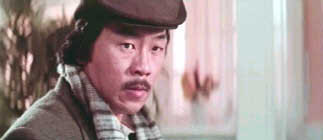 Besides the aforementioned TWO TOOTHLESS TIGERS,
MY YOUNG AUNTIE and MARTIAL CLUB, Wang’s best fighting displays can be
found in NEW SHAOLIN BOXERS, INVINCIBLE SHAOLIN (Wang’s best showcase in
a Venom movie) and YOUNG VAGABOND (81).
Besides the aforementioned TWO TOOTHLESS TIGERS,
MY YOUNG AUNTIE and MARTIAL CLUB, Wang’s best fighting displays can be
found in NEW SHAOLIN BOXERS, INVINCIBLE SHAOLIN (Wang’s best showcase in
a Venom movie) and YOUNG VAGABOND (81).
(Written up by Yves Gendron)
Wayne Lai Yiu-cheung
People may talk about the slowdown in the Hong
Kong film industry, but Wayne Lai certainly hasn’t noticed it. Beginning
his film career in 1997, Wayne had already appeared in over 60 films by
mid-2002! That is close to a film a month. Admittedly in a number of these
films his parts were small and many of these films are low budget one week
knockoffs but that’s still a lot of films.
 Like one of the other HK premier character actors,
Lam Suet, Wayne is almost chameleon like in his roles – playing every imaginable
type of character and in every type of genre – and often looking totally
different from one film to the next. In many of his films – especially
the low budget ones that have you wondering what you were thinking when
you purchased it – it is often only Wayne’s often bizarre or inspired character
depictions that keep you watching.
Like one of the other HK premier character actors,
Lam Suet, Wayne is almost chameleon like in his roles – playing every imaginable
type of character and in every type of genre – and often looking totally
different from one film to the next. In many of his films – especially
the low budget ones that have you wondering what you were thinking when
you purchased it – it is often only Wayne’s often bizarre or inspired character
depictions that keep you watching.
 Not that I have seen all that many of his 60 films,
but a few that I recall are Killing Me Tenderly as the shy fan of Sammi
Cheng and in Storm Riders he has a small but intriguing part as Mud Buddha.
One of my favorites was in PR Girls as the sexual Hello Kitty pervert into
kinky games. He has shown up in loads of horror films – a number of the
Troublesome Night series, Bio-Zombie (store owner), Fourteen Days Before
Suicide, Men are from Venus (the gay DJ), Last Ghost Standing (chops off
his own arm), Human Pork Chop, Vampire Contoller, Wicked Ghost III and
Sound from the Dark (the depressed suicidal fellow).
Not that I have seen all that many of his 60 films,
but a few that I recall are Killing Me Tenderly as the shy fan of Sammi
Cheng and in Storm Riders he has a small but intriguing part as Mud Buddha.
One of my favorites was in PR Girls as the sexual Hello Kitty pervert into
kinky games. He has shown up in loads of horror films – a number of the
Troublesome Night series, Bio-Zombie (store owner), Fourteen Days Before
Suicide, Men are from Venus (the gay DJ), Last Ghost Standing (chops off
his own arm), Human Pork Chop, Vampire Contoller, Wicked Ghost III and
Sound from the Dark (the depressed suicidal fellow).
 With his acting versatility though he has also
managed to find character roles in some quality films as well – Victim
(Tony Leung’s cop partner), Four Chefs and a Feast, Where a Good Man Goes
(Lau Ching-wan's follower), Bullets Over Summer, Gen-X Cops, Clean My Name
Mr. Coronor, Paramount Hotel (a cop), Intruder (the victim), Master Q (Michael
Chan’s lieutenant) and Visible Secret. With his average everyday looks
it is unlikely that he will ever reach leading man status, but he certainly
seems to have no problems finding work and staying very busy.
With his acting versatility though he has also
managed to find character roles in some quality films as well – Victim
(Tony Leung’s cop partner), Four Chefs and a Feast, Where a Good Man Goes
(Lau Ching-wan's follower), Bullets Over Summer, Gen-X Cops, Clean My Name
Mr. Coronor, Paramount Hotel (a cop), Intruder (the victim), Master Q (Michael
Chan’s lieutenant) and Visible Secret. With his average everyday looks
it is unlikely that he will ever reach leading man status, but he certainly
seems to have no problems finding work and staying very busy.
 Of course like most of the HK actors, Wayne somehow
also finds time to do TV – such as the very popular Journey to the West
in 1997 or So Tung Bor (2001).
Of course like most of the HK actors, Wayne somehow
also finds time to do TV – such as the very popular Journey to the West
in 1997 or So Tung Bor (2001).

Wei Pei.
Wei Pei (Wai Pak in Cantonese) could be termed
either the forgotten or unknown Venom. The Venoms were of course the Shaw
Brothers studio’s cult favourite team of acrobatic fight performers extraordinaire
who awed audiences with their jaw dropping near surreal brand of choreography
showcased in a dozen or so late seventies-early eighties movies by master
martial filmmaker Chang Cheh. His background would appear to be different
then his brethren, his physical skills more limited and he was cast in
only in a few of these “Venom” movies, with the result that he is usually
not considered as a “true” Venom at all by most fans, some of whom dismiss
him as a decorative pretty boy. Instead Wei Pei is nowadays mostly
remembered as a second banana player for the Golden Harvest’s movies of
Sammo Hung and Jackie Chan.
 This reviewer does not know the details of Wei
Pei’s background or how he came to the attention of the Shaw Brothers,
but most likely he was a contract player for them. He can first be glimpsed
in the non-Chang Cheh Shaw martial art classic THE FLYING GUILLOTINE (1975),
as well as in the Chang Cheh Taiwanese production DEATH CHAMBER (1976).
In 1978 Chang Cheh thought out a new brand of martial pictures by banding
together a bunch of mostly Taiwanese stuntmen selected for their great
skills and unique looks in stories combining bloody mayhem, a pulp fiction-like
narrative sensibility along with incredible choreography - and Wei Pei
was part of that group. The first film of this new breed was FIVE DEADLY
VENOMS where Wei play Venom no 2: the Snake a spoiled rich young man, who
conspires and kills to gain even greater fortune and power but who develops
a tormented conscience toward the end. In retrospect some have dismissed
Wei’ s part into the movie as a forcibly grafted “ glamorous pretty boy
“ interloper, but in reality however his Snake character fitted into the
story just as well as the other Venoms and he was quite involved in the
action despite his conspicuously more limited physical skills.
This reviewer does not know the details of Wei
Pei’s background or how he came to the attention of the Shaw Brothers,
but most likely he was a contract player for them. He can first be glimpsed
in the non-Chang Cheh Shaw martial art classic THE FLYING GUILLOTINE (1975),
as well as in the Chang Cheh Taiwanese production DEATH CHAMBER (1976).
In 1978 Chang Cheh thought out a new brand of martial pictures by banding
together a bunch of mostly Taiwanese stuntmen selected for their great
skills and unique looks in stories combining bloody mayhem, a pulp fiction-like
narrative sensibility along with incredible choreography - and Wei Pei
was part of that group. The first film of this new breed was FIVE DEADLY
VENOMS where Wei play Venom no 2: the Snake a spoiled rich young man, who
conspires and kills to gain even greater fortune and power but who develops
a tormented conscience toward the end. In retrospect some have dismissed
Wei’ s part into the movie as a forcibly grafted “ glamorous pretty boy
“ interloper, but in reality however his Snake character fitted into the
story just as well as the other Venoms and he was quite involved in the
action despite his conspicuously more limited physical skills.
 Wei Pei played in a couple more so-called “Venom”
movies (a tag name which was actually given at a much later date by Western
fans) such as TEN TIGERS OF KWANTUNG (78) INVINCIBLE SHAOLIN (79) and THE
KID WITH THE GOLDEN ARM (same). It’s at this point that Wei Pei left Shaw
and found his way to its H-K rival Studio Golden Harvest. How he got there
is not known. Did he go on his own or did Shaw sell his contract for some
reason; an unheard of move. It might be that Wei Pei actor’s contract was
with director Chang Cheh alone (as were the other Venoms), whose stipulations
were much more lax than those found usually in Shaw and which allowed him
to do his studio switch. In any, case at first glance this may have
appeared as a lucky break because while the first couple of Venom movies
had some success the rest got quickly buried while Golden Harvest martial
pictures were riding a high wave with the k-f comedies film of Sammo Hung.
Wei Pei played in a couple more so-called “Venom”
movies (a tag name which was actually given at a much later date by Western
fans) such as TEN TIGERS OF KWANTUNG (78) INVINCIBLE SHAOLIN (79) and THE
KID WITH THE GOLDEN ARM (same). It’s at this point that Wei Pei left Shaw
and found his way to its H-K rival Studio Golden Harvest. How he got there
is not known. Did he go on his own or did Shaw sell his contract for some
reason; an unheard of move. It might be that Wei Pei actor’s contract was
with director Chang Cheh alone (as were the other Venoms), whose stipulations
were much more lax than those found usually in Shaw and which allowed him
to do his studio switch. In any, case at first glance this may have
appeared as a lucky break because while the first couple of Venom movies
had some success the rest got quickly buried while Golden Harvest martial
pictures were riding a high wave with the k-f comedies film of Sammo Hung.
 Wei Pei’s first Golden Harvest production was
ironically enough in the Shaw Brother type swordplay LAST HURRAH FOR CHIVALERY
that was directed by a former Chang Cheh assistant director named John
Woo. He played an intrepid young swordsman coming out of retirement for
the sake of friendship but unaware that he’s being manipulated. Actually
this was Wei Pei’s very best role of his career but the film was a terrible
disappointment at the box-office. Years later after John Woo had become
a household name; Golden Harvest pulled the movie out of its vault, restored
it and marketed it to the west. As a result LAST HURRAH became an all too
rare seventies swordplay film that was available to westerners in subtitled,
letterbox format, a feat not even the dozen or so Venom movies can claim.
Wei Pei’s first Golden Harvest production was
ironically enough in the Shaw Brother type swordplay LAST HURRAH FOR CHIVALERY
that was directed by a former Chang Cheh assistant director named John
Woo. He played an intrepid young swordsman coming out of retirement for
the sake of friendship but unaware that he’s being manipulated. Actually
this was Wei Pei’s very best role of his career but the film was a terrible
disappointment at the box-office. Years later after John Woo had become
a household name; Golden Harvest pulled the movie out of its vault, restored
it and marketed it to the west. As a result LAST HURRAH became an all too
rare seventies swordplay film that was available to westerners in subtitled,
letterbox format, a feat not even the dozen or so Venom movies can claim.
 Next Wei Pei worked in the Sammo Hung/Yuen Woo
Ping collaborative work MAGNIFICENT BUTCHER (79) as one of Sammo’s fellow
students of Wong Fei Hung (Kwan Tak-hing). It was a relatively brief part
where Wei Pei had an extended showy fight against a pole monkey fighter
(former little seven fortune Yuen Mo). After that, Wei was cast in Jackie
Chan’s Golden Harvest debut YOUNG MASTER (80). At first his role looked
substantial as he played Jackie’s wayward brother Tiger, who after leaving
in disgrace from the martial art school leans towards a life of crime.
Once Jackie goes in search for him though, We Pei disappears from the picture
making only a couple of brief appearances - seemingly the victim of a then
novice director Jackie’s improvisational approach to storytelling.
Next Wei Pei worked in the Sammo Hung/Yuen Woo
Ping collaborative work MAGNIFICENT BUTCHER (79) as one of Sammo’s fellow
students of Wong Fei Hung (Kwan Tak-hing). It was a relatively brief part
where Wei Pei had an extended showy fight against a pole monkey fighter
(former little seven fortune Yuen Mo). After that, Wei was cast in Jackie
Chan’s Golden Harvest debut YOUNG MASTER (80). At first his role looked
substantial as he played Jackie’s wayward brother Tiger, who after leaving
in disgrace from the martial art school leans towards a life of crime.
Once Jackie goes in search for him though, We Pei disappears from the picture
making only a couple of brief appearances - seemingly the victim of a then
novice director Jackie’s improvisational approach to storytelling.
 It’s only after YOUNG MASTER that Wei Pei got
a starring role in a custom made movie. THE CHEEKY CHAP (81) was a k-f
comedy trying to fit Wei within a Jackie Chan naughty kid type of role.
It was however considered a sub-standard Golden Harvest offering. Next
came the more esteemed PHANTOM KILLER. That was it as far as Wei Pei’s
lead player career would go. His next part was in a very secondary role
in Sammo's martial art masterpiece PRODIGAL SON (82), as a skirt-chasing
Peking Opera leading man. While Wei’s introduction seemed to suggest that
he might be a relevant player in the movie, he has no fights, makes only
a couple of appearances and disappeared early on, a complete throwaway
part that could have being played by any character actor and likely given
to Wei to do him a favour or to keep him visible.
It’s only after YOUNG MASTER that Wei Pei got
a starring role in a custom made movie. THE CHEEKY CHAP (81) was a k-f
comedy trying to fit Wei within a Jackie Chan naughty kid type of role.
It was however considered a sub-standard Golden Harvest offering. Next
came the more esteemed PHANTOM KILLER. That was it as far as Wei Pei’s
lead player career would go. His next part was in a very secondary role
in Sammo's martial art masterpiece PRODIGAL SON (82), as a skirt-chasing
Peking Opera leading man. While Wei’s introduction seemed to suggest that
he might be a relevant player in the movie, he has no fights, makes only
a couple of appearances and disappeared early on, a complete throwaway
part that could have being played by any character actor and likely given
to Wei to do him a favour or to keep him visible.
 Afterwards Wei Pei was not seen in movies for
years. Meanwhile as the Venom movies were shown on American TV, a cult
following developed around the group by American teen and martial art movie
amateurs. While the likes of Kui Chok, “Cuttie Pie” Chieng Sheng and Lo
Meng became the favourites of a new generation of martial cinema devotees,
very little attention at all was given to the wayward Wei Pei.
Afterwards Wei Pei was not seen in movies for
years. Meanwhile as the Venom movies were shown on American TV, a cult
following developed around the group by American teen and martial art movie
amateurs. While the likes of Kui Chok, “Cuttie Pie” Chieng Sheng and Lo
Meng became the favourites of a new generation of martial cinema devotees,
very little attention at all was given to the wayward Wei Pei.
 Wei Pei made a one-time return in a big screen’s
lead role for the 1988 supernatural comedy THE DEVIL AND THE GHOST BUSTER.
His final screen appearance was an all too brief part in John Woo’s HARDBOILED
(94). All these years Wei Pei worked as a TV actor for TVB, a TV station
owned ironically by Shaw, the studio Wei had left all these years ago.
Wei Pei made a one-time return in a big screen’s
lead role for the 1988 supernatural comedy THE DEVIL AND THE GHOST BUSTER.
His final screen appearance was an all too brief part in John Woo’s HARDBOILED
(94). All these years Wei Pei worked as a TV actor for TVB, a TV station
owned ironically by Shaw, the studio Wei had left all these years ago.
 Because of his good looks and his bad luck, many
have taken a slight view of Wei Pei summing him up as just a pretty face
without that much actual talent. In truth it seems that he had solid enough
acting and physical skills, but that he had the misfortune of playing alongside
more flashy players who overshadowed him or in the wrong movies at a time
when martial art cinema was winding down.
Because of his good looks and his bad luck, many
have taken a slight view of Wei Pei summing him up as just a pretty face
without that much actual talent. In truth it seems that he had solid enough
acting and physical skills, but that he had the misfortune of playing alongside
more flashy players who overshadowed him or in the wrong movies at a time
when martial art cinema was winding down.
(Written up by Yves Gendron)

Whang In Shik
Born in Korea in 1940
Whang In Shik is one of those famous “bootmasters”
who back in the k-f cinema good old days marvelled the audience with their
spectacular kicking. Unlike most of his kindred though who were for the
most part Takwendo exponents, Whang is unique as his expertise is in the
Korean fighting art of Hapkido. Whang also has one of the most superb track
records of all as through the years he had bouts with the likes of Bruce
Lee, Angela Mao, Kwan Tak-hing, Sammo Hung, Jackie Chan and Cynthia Rothrock.
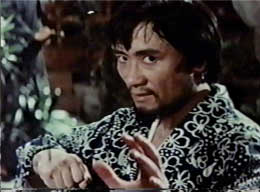 Whang was born in 1940 in Korea naturally. He
began receiving instruction around the age of 13 under the tutelage of
Hapkido’s founding fathers themselves, Choi Yong Sool and Ji Han Jae. Similar
to the Korean Martial art style of Takwendo, Hapkido is a style centred
around kicking techniques but some of the moves are unique to that style
such as the famous “spin kick. But Hapkido also includes elaborate punching,
throwing and hooking moves. Whang developed into one of the most consummate
Hapkido exponents of all, able to perform 360-degree spin kicks within
a split second. Interestingly enough, Whang also learned chiropractic and
acupuncture skills so as to be able to heal as well as to hurt.
Whang was born in 1940 in Korea naturally. He
began receiving instruction around the age of 13 under the tutelage of
Hapkido’s founding fathers themselves, Choi Yong Sool and Ji Han Jae. Similar
to the Korean Martial art style of Takwendo, Hapkido is a style centred
around kicking techniques but some of the moves are unique to that style
such as the famous “spin kick. But Hapkido also includes elaborate punching,
throwing and hooking moves. Whang developed into one of the most consummate
Hapkido exponents of all, able to perform 360-degree spin kicks within
a split second. Interestingly enough, Whang also learned chiropractic and
acupuncture skills so as to be able to heal as well as to hurt.
 In the early seventies, Whang was part or a Hapkido
tour showcasing in H-K. The show attracted the attention of movie people
and soon enough both he and some of his fellow Hapkido exponents began
teaching their art to Golden Harvest female star Angela Mao as well as
Golden’s own house action choreographer Sammo Hung. Bruce Lee had
just recently revealed the spectacular cinematic power of high kicks and
this drew attention to any martial style which features kicking techniques
including among them Hapkido. It was also thought that teaching Hapkido
to Angela Mao would make her distinct from other female martial art stars
of the time. Not surprisingly, Golden soon started making a film around
the Korean fighting art called HAPKIDO starring Mao in which the art “founder”
Ji Han jao had a small guest starring part while Whang was cast (big surprise)
as Angela’s own Hapkido instructor.
In the early seventies, Whang was part or a Hapkido
tour showcasing in H-K. The show attracted the attention of movie people
and soon enough both he and some of his fellow Hapkido exponents began
teaching their art to Golden Harvest female star Angela Mao as well as
Golden’s own house action choreographer Sammo Hung. Bruce Lee had
just recently revealed the spectacular cinematic power of high kicks and
this drew attention to any martial style which features kicking techniques
including among them Hapkido. It was also thought that teaching Hapkido
to Angela Mao would make her distinct from other female martial art stars
of the time. Not surprisingly, Golden soon started making a film around
the Korean fighting art called HAPKIDO starring Mao in which the art “founder”
Ji Han jao had a small guest starring part while Whang was cast (big surprise)
as Angela’s own Hapkido instructor.
 While filming HAPKIDO, Whang was throwing his
weight around and hitting stuntmen for real in the fight scenes. It seems
that he was keen to show Hapkido’s superiority over Chinese fighting art.
Word of this got to Bruce Lee who was working on a nearby set for his own
film WAY OF THE DRAGON. He hired Whang and proceeded to show him who was
really the boss during their own fight scenes. He did not hurt him, but
Whang most certainly came away with a new appreciation if not for Chinese
fighting at least for Bruce Lee. On the WAY OF THE DRAGON movie set, Whang
also met kick-boxing champion Chuck Norris. In the movie Chuck easily trashes
Whang’s fighting henchman character but things were not so one sided in
real life. “Just let go, I can take it”, Chuck said to Whang as they were
about to film their fight. As he proceed to almost getting knocked off
his feet, Norris suddenly became much less keen to be at the receiving
end of his opponent’s feet
While filming HAPKIDO, Whang was throwing his
weight around and hitting stuntmen for real in the fight scenes. It seems
that he was keen to show Hapkido’s superiority over Chinese fighting art.
Word of this got to Bruce Lee who was working on a nearby set for his own
film WAY OF THE DRAGON. He hired Whang and proceeded to show him who was
really the boss during their own fight scenes. He did not hurt him, but
Whang most certainly came away with a new appreciation if not for Chinese
fighting at least for Bruce Lee. On the WAY OF THE DRAGON movie set, Whang
also met kick-boxing champion Chuck Norris. In the movie Chuck easily trashes
Whang’s fighting henchman character but things were not so one sided in
real life. “Just let go, I can take it”, Chuck said to Whang as they were
about to film their fight. As he proceed to almost getting knocked off
his feet, Norris suddenly became much less keen to be at the receiving
end of his opponent’s feet
 In HAPKIDO Whang actually played the good guy,
but his fierce looks made him more suited to play fiendish villains. So
in his other Golden Harvest films starting with WHEN TAKENWENDO STRIKES
(73), which saw the near historical encounter between Whang’s Hapkido and
the Takwendo mastery of the film’s special star Korean American master
Joon Rhee who had been instrumental in importing his art to the USA. It
was in SKYHAWK (74), that Whang had his most striking part as a long grey
haired evil martial art master which saw him battle martial art cinema’s
legend Kwan Tak-hing; the original Wong Fei Hung actor. Actually though,
Whang hated acting but he continued to do movies as a favour for his students
Angela and Sammo. He lasted for a total of three years and was in
eight movies including FIST OF THE UNICORN (73), THE TOURNEMENT, DEVIL’S
ISLAND, STONER (all 74) and the ASSOCIATION, calling it quits in 1975 at
a time when the once booming k-f trend was at all time low.
In HAPKIDO Whang actually played the good guy,
but his fierce looks made him more suited to play fiendish villains. So
in his other Golden Harvest films starting with WHEN TAKENWENDO STRIKES
(73), which saw the near historical encounter between Whang’s Hapkido and
the Takwendo mastery of the film’s special star Korean American master
Joon Rhee who had been instrumental in importing his art to the USA. It
was in SKYHAWK (74), that Whang had his most striking part as a long grey
haired evil martial art master which saw him battle martial art cinema’s
legend Kwan Tak-hing; the original Wong Fei Hung actor. Actually though,
Whang hated acting but he continued to do movies as a favour for his students
Angela and Sammo. He lasted for a total of three years and was in
eight movies including FIST OF THE UNICORN (73), THE TOURNEMENT, DEVIL’S
ISLAND, STONER (all 74) and the ASSOCIATION, calling it quits in 1975 at
a time when the once booming k-f trend was at all time low.
 Whang came back to the movies in 1980 for Jackie
Chan’s YOUNG MASTER as the thundering kicking villain. For the finale,
Jackie showcased Whang’s Hapkido fighting techniques in rich detail, not
only the kicking but also the joint lock, the throws and the punches. The
resulting showdown is far too long for it’s own good (nearly twenty minutes),
but remains the finest Hapkido oriented fight displays ever put on screen.
At one point Whang even applied nearly half a dozen painful locking joint
lock techniques on a poor hapless Jackie. In the end the audience was left
as much in awe with Whang’s superb techniques as with Jackie’s capacity
to endure pain. The film remains Whang’s best showcase and his own favourite
film appearance for obvious reasons and is his best known movie.
Whang came back to the movies in 1980 for Jackie
Chan’s YOUNG MASTER as the thundering kicking villain. For the finale,
Jackie showcased Whang’s Hapkido fighting techniques in rich detail, not
only the kicking but also the joint lock, the throws and the punches. The
resulting showdown is far too long for it’s own good (nearly twenty minutes),
but remains the finest Hapkido oriented fight displays ever put on screen.
At one point Whang even applied nearly half a dozen painful locking joint
lock techniques on a poor hapless Jackie. In the end the audience was left
as much in awe with Whang’s superb techniques as with Jackie’s capacity
to endure pain. The film remains Whang’s best showcase and his own favourite
film appearance for obvious reasons and is his best known movie.
 Whang returned for another gruelling fighting
session with Jackie for his DRAGON LORD (82) and fought minor k-f cult
star Billy Chow in FISTFUL OF TALONS (83). His last screen appearance was
in BLONDE FURY (87), starring Cynthia Rothrock. Since then Whang
has immigrated to Canada, where he teaches Hapkido. A couple of years ago
he was a guest at a special showing of YOUNG MASTER in Toronto by the now
defunct local branch of the Fantasia Film festival.
Whang returned for another gruelling fighting
session with Jackie for his DRAGON LORD (82) and fought minor k-f cult
star Billy Chow in FISTFUL OF TALONS (83). His last screen appearance was
in BLONDE FURY (87), starring Cynthia Rothrock. Since then Whang
has immigrated to Canada, where he teaches Hapkido. A couple of years ago
he was a guest at a special showing of YOUNG MASTER in Toronto by the now
defunct local branch of the Fantasia Film festival.
(Written up by Yves Gendron)
William Ho Kar-kui
With a cinema that simply gorges itself on
sick perverse villains and always seems to have room for another, an actor
with the leering scowling cruel face of Ho had no worries. There have been
roles I am sure in which he has played a fine outstanding fellow, but he
is certainly most memorable for the sleazy characters he has played in
Cat. III films and the very nasty things he has done to Lily Chung.
 A small choice selection from his lengthy filmography
would be: Daughter of Darkness I (the father) and II (1993), Brother of
Darkness (brother), Sex for Sale, Devil Sex Love, Bloody Beast, Possessed,
The Six Devil Women, The Story of Ricky (the warden).
A small choice selection from his lengthy filmography
would be: Daughter of Darkness I (the father) and II (1993), Brother of
Darkness (brother), Sex for Sale, Devil Sex Love, Bloody Beast, Possessed,
The Six Devil Women, The Story of Ricky (the warden).

Wilson Lam Chun-yin
Born on 10/23/1961
Whatever happened to Wilson Lam I wonder? From
1988 to 1993 he brought his innocent good looks and his solid physical
skills to bear in a number of HK films and then seems to have disappeared
from films. His filmography during this short period was a mix of action,
comedy and drama that seemed to indicate that a solid if not great career
lay ahead of him.
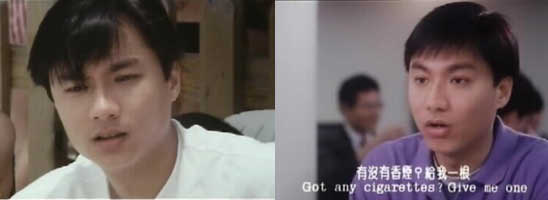 Some of these films are: How to Pick Up Girls
– a goofy Wong Jing comedy, News Attack, Reincarnation of Golden Lotus,
Fortune Code (one of the pilots), Perfect Girls (the lead character looking
for love), Magic Cop (one of the two cops), Kickboxers Tears (the pickpocket
who teams up with Moon Lee, Angels Force (Moon’s boss), The Enigma of Love
(Maggie Cheung’s supervisor), Mary from Beijing (Gong Li’s boyfriend),
Lethal Contact (the cop from Borneo) and My Hero (the cool hero). This
doesn’t make a hugely impressive collection of films, but it still puzzles
me that he vanished soon after from the film scene.
Some of these films are: How to Pick Up Girls
– a goofy Wong Jing comedy, News Attack, Reincarnation of Golden Lotus,
Fortune Code (one of the pilots), Perfect Girls (the lead character looking
for love), Magic Cop (one of the two cops), Kickboxers Tears (the pickpocket
who teams up with Moon Lee, Angels Force (Moon’s boss), The Enigma of Love
(Maggie Cheung’s supervisor), Mary from Beijing (Gong Li’s boyfriend),
Lethal Contact (the cop from Borneo) and My Hero (the cool hero). This
doesn’t make a hugely impressive collection of films, but it still puzzles
me that he vanished soon after from the film scene.
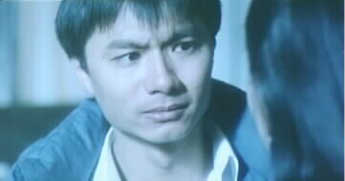 He has also appeared in a few TV series where
he got his start in 1982 – The Key Man, The Foundling’s Progress and Withered
in the Wind.
He has also appeared in a few TV series where
he got his start in 1982 – The Key Man, The Foundling’s Progress and Withered
in the Wind.

























































